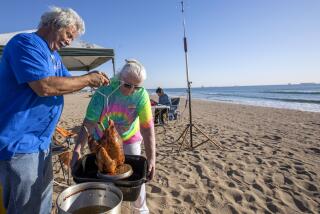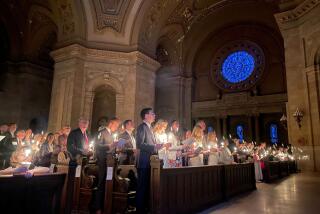This year, sanitizer for the hand of God
- Share via
FORT WAYNE, IND., AND LOS ANGELES — After weeks of listening to parishioners sniffle in the pews, and worrying about the spread of the pandemic H1N1 influenza virus, the Roman Catholic Diocese of Fort Wayne-South Bend decided its flock needed to make some sacrifices this flu season.
So this week, the priests will be locking up their Communion chalices and, as a precaution against the spread of germs, temporarily stopping the practice of offering wine during the sacrament.
“When you have 4,500 people showing up for Mass, and you have eight cups for the populace, it’s easy to see how this could become a problem -- fast,” said Father John Kuzmich of St. Vincent de Paul in Fort Wayne, whose church in northeastern Indiana has about 10,000 members.
As flu season gets underway and fears mount over reports of rising deaths from H1N1, commonly known as swine flu, many congregations across the country are taking precautions by adjusting their rituals.
“It’s the prudent thing to do,” said Father Marcos Gonzalez of St. John Chrysostom Catholic Church in Inglewood, which also plans to offer parishioners the Eucharist but no wine in coming weeks.
Stanford University’s Memorial Church is asking congregants to dip the Communion bread into the wine, and Grace Episcopal Cathedral in Topeka, Kan., has taken a more unusual step: wiping its chalices with vodka-soaked gauze after each parishioner takes a sip.
“Obviously, if you are wiping with 80-proof alcohol, you are probably being about as safe as you can be,” said the Very Rev. Steve Lipscomb, the cathedral’s dean, who noted that the alcohol had the added benefit of removing lipstick from the gold-and-silver cups. “Germs don’t like . . . a high volume of alcohol.”
Other congregations have different solutions.
Members of the United Church of Christ in Garden City, N.Y., have been asked to raise their hands -- instead of shaking others’ -- when greeting congregants during the service. And in Muncie, Ind., volunteers at Union Chapel Ministries are pulling on protective gloves each Sunday before they pick up the collection plates.
Federal and state health officials say these are small but necessary changes to limit the spread of the virus.
Last week, the U.S. Centers for Disease Control and Prevention reported that swine flu was widespread in 37 states, up from 27 a week earlier. The death toll also promises to be higher than in the last three flu seasons, when 47 to 88 children died each year. By Tuesday, the number of children who had succumbed to complications of swine flu this year stood at 81.
The federal Department of Health and Human Services has released a guide that encourages clergy to urge their followers to avoid crowds, wash their hands and use hand sanitizer.
Some religious leaders, while preaching the virtues of hand washing and proper hygiene, are also cautioning against hysteria.
Bel Air Presbyterian Church has placed large bottles of hand sanitizer around its sprawling hilltop campus overlooking the San Fernando Valley. Beyond that, church leaders are advising parishioners to use common sense.
“We have a saying around here: ‘prudent faith,’ ” Executive Director Glenn Reph said of the church that once counted Ronald Reagan among its members. “That’s the balancing act between faith and reason.”
Yet the fear of getting sick, even in a sanctuary, is hard to ignore.
Tina Kicklighter, a public relations executive in the small city of Patterson, Ga., says she finds herself growing nervous each Sunday morning as she joins the crowd inside her Baptist church.
“We have what’s known as the ‘hand of fellowship,’ where we stop singing and shake hands with everyone,” said Kicklighter, 46. “I started thinking, ‘They might be good people, but they might not have good hygiene.’ ”
Kicklighter tried carrying sanitizer in her purse and using it after shaking hands, but people chastised her for being rude. She tried sneaking to the bathroom during the service, to avoid the contact, but parishioners just waited to give her a hug when she returned.
“I tried reading the Bible, being engrossed in a conversation, even standing there with my arms crossed,” Kicklighter said. “Nothing works. So I just grit my teeth.”
Health officials agree that limiting contact may help protect the community, particularly young people who may be most at risk for swine flu.
At Temple Beth Orr in Coral Springs, Fla., several members’ children were quarantined at camp this summer when they tested positive for H1N1.
When they returned home, the Jewish temple’s leaders installed antiseptic hand-washing stations outside each classroom and instituted a new rule: When students arrive for religious classes, they are required to wash their hands before they begin their studies.
“The point is to protect people and help them protect themselves,” said David Oney, the temple’s administrator.
The desire to stay germ-free, though, hasn’t weakened the sense of community among the faithful. The challenge of not having physical contact has strengthened one congregation’s determination to cement its bond.
When the leaders of the First Baptist Church of Blackshear, Ga., told their 1,300 members that because of the flu, they would share smiles instead of handshakes, some parishioners grumbled.
Then they got creative. People stood in the aisles and waved. Others danced, bumped fists or knocked elbows.
“The only thing I told them was please, no hip bumping,” said Pastor Bill Young, 59. “They know it’s temporary. But the need for human connection is real, and no flu can stop it.”
--
duke.helfand@latimes.com
More to Read
Sign up for Essential California
The most important California stories and recommendations in your inbox every morning.
You may occasionally receive promotional content from the Los Angeles Times.










